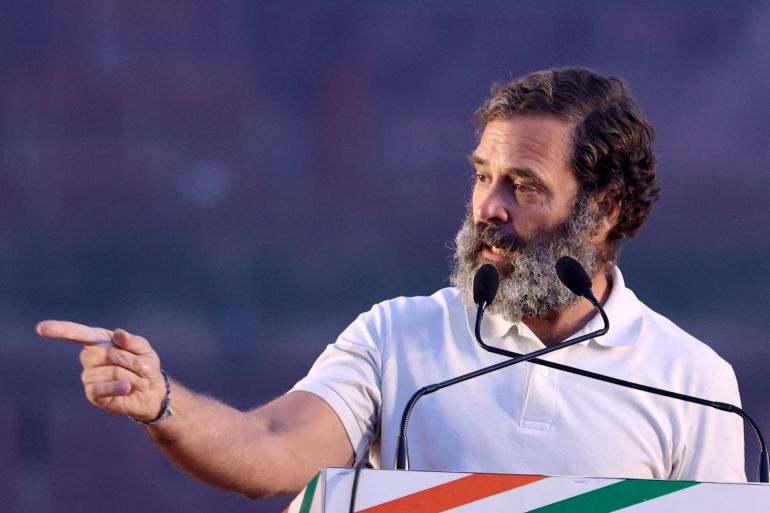India opposition leader Rahul Gandhi challenges jail sentence
Congress leader files appeal in Surat court following a two-year jail sentence in a defamation case brought by a BJP legislator.

Indian opposition party leader Rahul Gandhi has appealed his two-year jail sentence in a defamation case brought against him by a legislator from Prime Minister Narendra Modi’s Bharatiya Janata Party (BJP).
Gandhi, the 52-year-old scion of the Nehru-Gandhi family and leader of the Congress party, was found guilty of defamation by a court in the western state of Gujarat over comments he made in a speech in 2019.
Gandhi has filed a plea in the Surat sessions court, hoping to overturn a judgment that resulted in his expulsion from parliament a year before a general election is due.
The court is scheduled to hear Gandhi’s plea later on Monday.
India’s parliament disqualified Gandhi after the sentencing as the law that governs elections in India mandates disqualification of any lawmaker who is “convicted of any offence and sentenced to imprisonment for not less than two years”.
A lower court sentenced Gandhi on March 23 to two years in jail on charges of defamation over a comment he made while campaigning ahead of the last general election.
In a speech that year, the Congress leader referred to two fugitive businessmen, both surnamed Modi and asked: “How come all thieves have the name Modi?”
“The 2019 speech was not aimed at defaming millions of people having the surname Modi,” Gandhi’s lawyer Kirit Panwala said, adding that their appeal would also highlight “procedural lapses” in the trial.
Opposition politicians say Gandhi’s sentencing and disqualification are the latest evidence of the Modi government’s strong-arm tactics and follow investigations and legal troubles faced in recent months by other opposition parties.
BJP leaders reject that and say Gandhi’s case represents the Congress party’s “arrogance and its readiness to hurt sections of society” to settle political scores with the prime minister.
Gandhi said on March 25 that he would not comment on his sentence as the matter was sub judice, but he said his disqualification from parliament was because he had been asking Modi what he called “tough questions” over his relationship with Gautam Adani, founder of the Adani conglomerate.
The opposition accuses the Modi government of giving undue favours to a business group led by billionaire tycoon Adani.
Shares of Adani Group companies plunged after Hindenburg Research on January 24 alleged the Indian conglomerate had engaged in stock manipulation and used tax havens. It also said the group had unsustainable debt.
A day after Gandhi’s conviction, 14 political parties jointly petitioned the Supreme Court, saying opposition groups were being selectively targeted by federal investigative agencies. The top court has agreed to hear the plea on Wednesday.
-al jazeera







